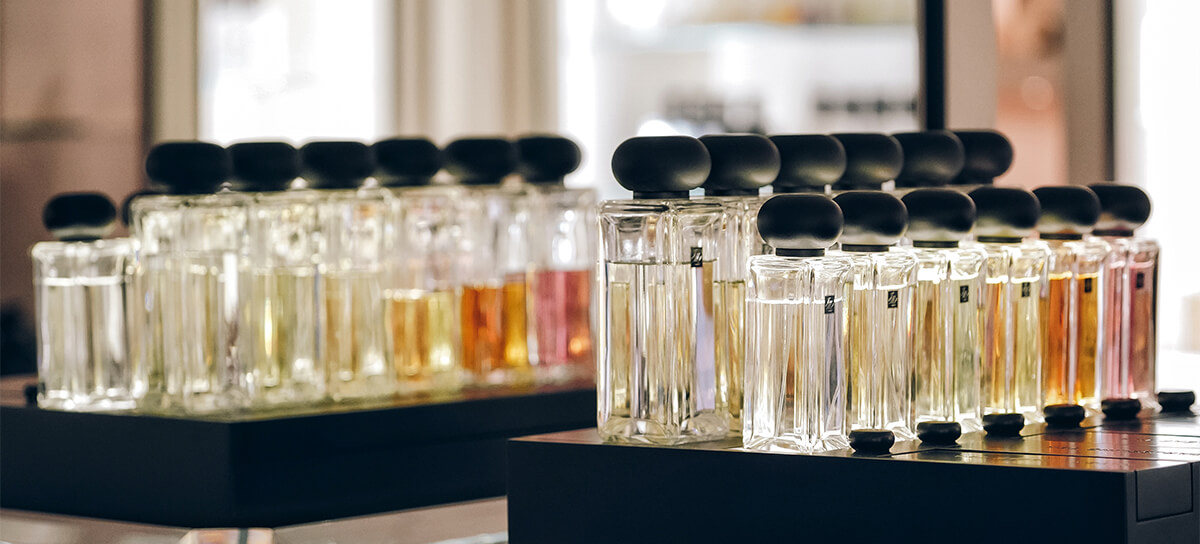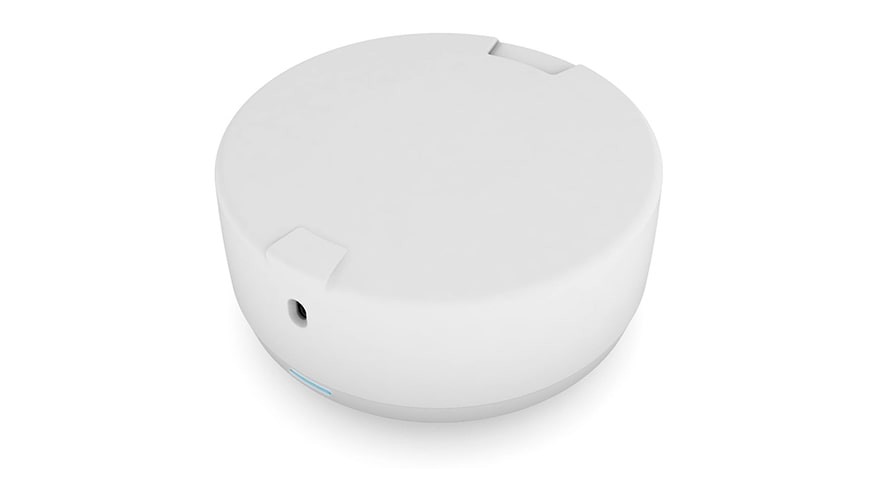Remote-Controlled Aroma Diffuser for Perfume Stores
Background
Scents play an important role in shaping the atmosphere and emotional perception. Businesses actively use them in many fields, from retail and restaurants to hotels, offices, medical institutions, and even cinemas. Today, technological advancements allow for creating personalized scent scenarios for each space and purpose. This way, entrepreneurs can enhance the movie experience, increase customer loyalty, or integrate scent control into smart home systems.
Modern aroma diffusers not only allow remote control of scents but can also be adapted to specific business processes or user preferences. This opens up new opportunities for marketing, increasing comfort, and creating a unique user experience.

Request
Integra Sources was contacted by an entrepreneur who had designed an aroma diffuser for the perfume business. However, it was necessary to implement BLE connectivity in the device and develop a number of applications and utilities to finish the project.
Not wanting to expand the in-house team and seeking to optimize costs, the client turned to the Integra team. He was impressed with our portfolio of projects and the skill level of our engineers. Another important factor was our competitive rates compared to many similar companies in North America and Western Europe.
Our task was to develop several applications that would allow the solution to be adapted for the perfume business. The team studied the client’s device, analyzed the intended use scenarios, and created a range of software products.
Solution
The device itself is a remote-controlled aroma diffuser with capsules inside. These capsules can contain not only perfumes but also various aromatic liquids that mimic the scents of nature, smoke, fruits, flowers, spices, and so on. The device selects the required capsule and sprays the liquid in small portions.
At the beginning of the project, we designed an additional printed circuit board with a Bluetooth module and flash memory so that the device could receive commands via Bluetooth Low Energy. Later, the solution was implemented on a single printed circuit board to reduce production costs. Then the team moved on to developing the control application.
Mobile Application for Perfume Stores
After analyzing how the solution should work in this industry, we developed an application for tablets that can be used by both store employees and visitors.
- For employees, we implemented the ability to log into the app, as well as connect and configure one or more aroma diffusers installed in the store.
- For visitors, the team created an interactive catalog that recommends one or several scents matching the customers’ preferences based on their answers. The information is displayed on the tablet screen. Customers can sample the chosen scent using the aroma dispenser or spray any of the loaded fragrances.

The solution created by Integra Sources simplifies the installation and configuration of the equipment, automates customer service, and increases visitors’ engagement. Additionally, the app collects the statistics of customer preferences.
Additional Software
As part of the project, we also completed a number of additional tasks:
- We modified the firmware of the aroma dispenser to implement a mesh network based on OpenThread, enabling the use of these devices in cinemas.
- The team developed a software development kit—a library that allows third-party developers to create their own programs compatible with the client’s aroma dispensers.
- We created a licensing system that enabled the client to offer their devices via a subscription model.
- Integra Sources developed a utility for testing the devices during production in semi-automatic mode.
- We created a mobile application for maintenance personnel that allows executing specific functions and commands on the device to diagnose the system.
Major Issues Resolved
The Interactive Catalog Algorithm
Initially, the scent recommendation algorithm was implemented directly within the application for perfume stores. Later, the client requested a web application with the same functionality. To avoid duplication, we separated the algorithm into a standalone library. It operates on a separate server and connects to both applications via an API (application programming interface). Any changes to the interactive catalog (new scents or questions) are made only in the library, while the applications serve as interfaces for data input and output.
Common Library for Applications
At one point, the team was working simultaneously on two applications for the device. Although they were intended for different use scenarios, some functionality in the programs was identical. This included algorithms for interacting with aroma diffusers and device configuration, to name a few. To speed up the work and avoid additional costs for the client, we proposed moving these parts into a separate library.
If the team needs to add a feature to this common part of the applications, it is enough to make changes in the library before building a new version of the app.
Adapting Different Types of Wireless Communication
Within the project scope, we also worked on adapting the solution for other potential applications, particularly commercial cinemas. We decided to use a mesh network based on OpenThread to send files with scent activation algorithms to devices. However, the data had to be transmitted from the Bluetooth module that receives these files to the MCU that controls the diffuser. The latter uses its own proprietary protocol. Therefore, the team had to develop an adapter that converts data from OpenThread to the protocol used by the MCU.
Ability to Copy Device Settings
At the client's request, we implemented a feature that allows app users to transfer the settings of a specific device to other aroma dispensers, including those located in different perfume stores.
Automated Code Conversion into a PHP Extension
In order for the web application to communicate with the interactive catalog algorithm (written in C++), it was necessary to convert its code into a PHP extension. We decided to use the SWIG library. It automatically converts the code, which significantly simplifies and speeds up the process.
Scope of Work
- Additional printed circuit board design, prototyping, and testing.
- Embedded software development for the Bluetooth module microcontroller.
- Mobile application development for device management and maintenance.
- Desktop application development for additional product use cases (in commercial and home cinemas).
Technologies
- Altium Designer for schematics and PCB design.
- MS88SF2 Bluetooth module.
- Firmware was written in C/C++.
- OpenThread for the mesh network.
- Mobile applications for Android were developed in C++ using the Qt framework.
- Desktop applications for Windows and Linux were created in C++ using Qt .
- The libraries were developed in C++ using Qt. Conversion to a PHP extension was implemented with the SWIG library.
Result
- The Integra team helped the customer achieve their key goal of bringing an innovative aroma diffuser to market and adapting it to the needs of the perfume business. The client is also considering new use scenarios for the device in other industries.
- Thanks to our involvement, the client avoided the need to expand their staff and significantly reduced development costs.
- Our team not only fulfilled all assigned tasks but also proposed architectural solutions that accelerated the development process.
- Special attention was given to the user experience: the developed applications are intuitive and allow easy device management.
Currently, the team is working on a mobile application for using the aroma diffusers at home. It allows one to connect and configure devices, activate scents manually, set schedules, and control the order of sprays and the interval between them. The customer also plans to adapt the solution for the hotel industry, where devices can be installed in guest rooms.
This project has become an example of effective partnership. Integra Sources’ expertise enabled the client not only to accomplish an ambitious technological task but also to lay the foundation for further business growth and product line expansion. We expect to integrate the solution with smart home systems and enter new markets in the future, which will provide the customer with a sustainable competitive advantage and additional sources of revenue.
At the same time, Integra Sources has become a reliable and trusted partner for the client, as the team has obtained extensive experience working with the solution. We continue to help our customer quickly and efficiently adapt the aroma diffuser to the needs and specifics of various industries.
You might also like...

Firmware Development for Augmented Reality Glasses
The team improved the customer’s firmware for augmented reality glasses by developing drivers for the displays, accelerometer, and gyroscope of the device. 
LEARN MORE 

Software for EEG System
The Integra Sources team developed energy-efficient embedded software and an SDK for a medical EEG system. We delivered robust data transfer and storage, implemented multitasking on FreeRTOS, and improved connection security. 
LEARN MORE 



